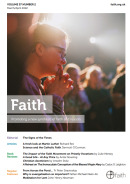Book Review: A stirring call to spiritual arms
A stirring call to spiritual arms
Christian Asceticism by Anselm Stolz OSB, tr. Giles Conacher OSB, Arouca Press, xxxii+159pp, £18.99 (hardback), £13.99 (paperback)
Review by Sr. Mary Thomas
This English translation of Dom Anselm Stolz’s posthumously published Ascèse Chretienne at last makes available to anglophone readers the companion volume to his The Doctrine of Spiritual Perfection (1938, reprinted 2001). The original German title translates simply as ‘Theology of Mysticism’, and it was a brilliant essay on the nature of Christian prayer: a synthesis of Gregory the Great and Thomas Aquinas which made a vibrant and theologically rigorous contribution to the tradition which sees mysticism as the ‘normal’ (if uncommon) culmination of Christian life.
Christian Asceticism is not a handbook of ascetic practices such as fasting, nor is it a discussion of the significance of such practices. ‘Asceticism’ here is being used to mean ‘the ascetic life’, a life explicitly dedicated to the pursuit of Christian perfection, ultimately to contemplation, in the practice of the evangelical counsels, by grace of a call from God. That sounds very much like what we would now call the consecrated life. He was indeed a monk speaking to monks about their own life. However, even if the religious life requires a special call and grace from God, an account of the essence of ascetic life sheds light on Christianity as such; for if mysticism is the full flowering of ‘ordinary’ Christian life, the ascetic life likewise, Stolz maintained (in company with a strong tradition), is simply the logical fulfilment of the trajectory of Christianity.
‘Outside the world’
Stolz finds the historical and theological essence of ascetic life in the desert-dwelling hermits, and so he identifies the most fundamental notion of Christian ascetism as extra mundum fieri: literally, ‘becoming outside-the-world’, becoming wholly alien to the world. This does not sound very promising as a concept to help Christians living in the world (or even non-enclosed religious), but in fact it turns out to be remarkably timely. Although hermits and enclosed religious are very visibly ‘outside’ the life of the world, none of the baptised belongs to the world. The world is not our final home, and it is destined for destruction; moreover, since the Fall, it is a realm where the forces of evil have a certain freedom of action. To be part of the kingdom of God is not to be part of the kingdom of the world.
Being ‘outside the world’ thus simply describes the Christian condition, a condition which has to be ever more fully realised in our own spiritual growth. It is striking that, precisely when insisting on the distinct character of ascetic life, Stolz notes in passing that any Christian may be in a situation where truly heroic ascetic efforts are necessary simply for spiritual survival. And this can only be possible thanks to the same means (in dependence upon grace): mortification, prayer, Scripture, participation in the Sacraments.
The ascetic as martyr
What makes this a truly timely emphasis becomes apparent when Stolz goes on to another fundamental concept of the ascetic life: the ascetic as martyr. The martyr, Stolz holds, is the ultimate witness of Christianity’s claim to public existence; or, to put it the other way round, the Christian martyr’s willingness to die is the ultimate rejection of any worldly authority’s claim to absolute value. There is a long tradition of seeing the ascetic as the heir to the martyr: laying down one’s life in voluntary mortification is analogous to laying down one’s life through an inflicted death. Stolz emphasises that the martyr is given a special grace of union with Christ, and hence a special role as intercessor; the ascetic, too, is called to close friendship with Christ and an apostolate of prayer. But, if monks and other religious have a particular call, every Christian has to expect his life to be a life of battle. ‘Martyrdom reveals clearly what the Christian life is, and what is its situation in this world. For whoever wants to rule his life in accord with the teachings of Jesus Christ, conflict is inevitable, for in a world like ours the Christian life cannot flourish in peace, it will be a struggle to the very end.’
In an alien culture
Stolz was speaking in 1939, and I think he knew which way the wind was blowing. Today, too, as western Christians find themselves in an increasingly alien culture, it is a valuable encouragement to be reminded that the martyr is the icon of Christian commitment. Stolz quotes Thomas Aquinas to show that every Christian needs to cultivate the dispositions which would make one ready for martyrdom. More generally, heroic virtue is sometimes the only Christian option. ‘It would be a fatal illusion to think that the Gospel’s sole object ... was to infiltrate and quietly transform the sphere of public and private life, without stirring up either crises or trouble. The reality of the Christian life is quite otherwise. The life of the Church is a continual struggle between two kingdoms: that of God and that of the Prince of this world. The same must be said of the work of sanctification in every individual.’
Silence
The brief but powerful chapter on silence also has particularly contemporary resonance. Stolz presents language as a sublime privilege, a uniquely human reflection of the eternal Word of God — or at least, it should be. Our language has in fact fallen along with our nature. Silence is a necessary path towards the healing of speech, making possible its full redemption in prayer. There are surely implications here for the task of finding a Christian path of engagement in our hyper-communicative age.
Stolz give us a stirring call to spiritual arms in the interior battle. Although this book is short, it is rich. As a sequel, Christian Asceticism comes eighty years late, but Stolz is a voice for our times.
Sr Mary Thomas Brown OSB is a nun of St Cecilia’s Abbey, Ryde.






